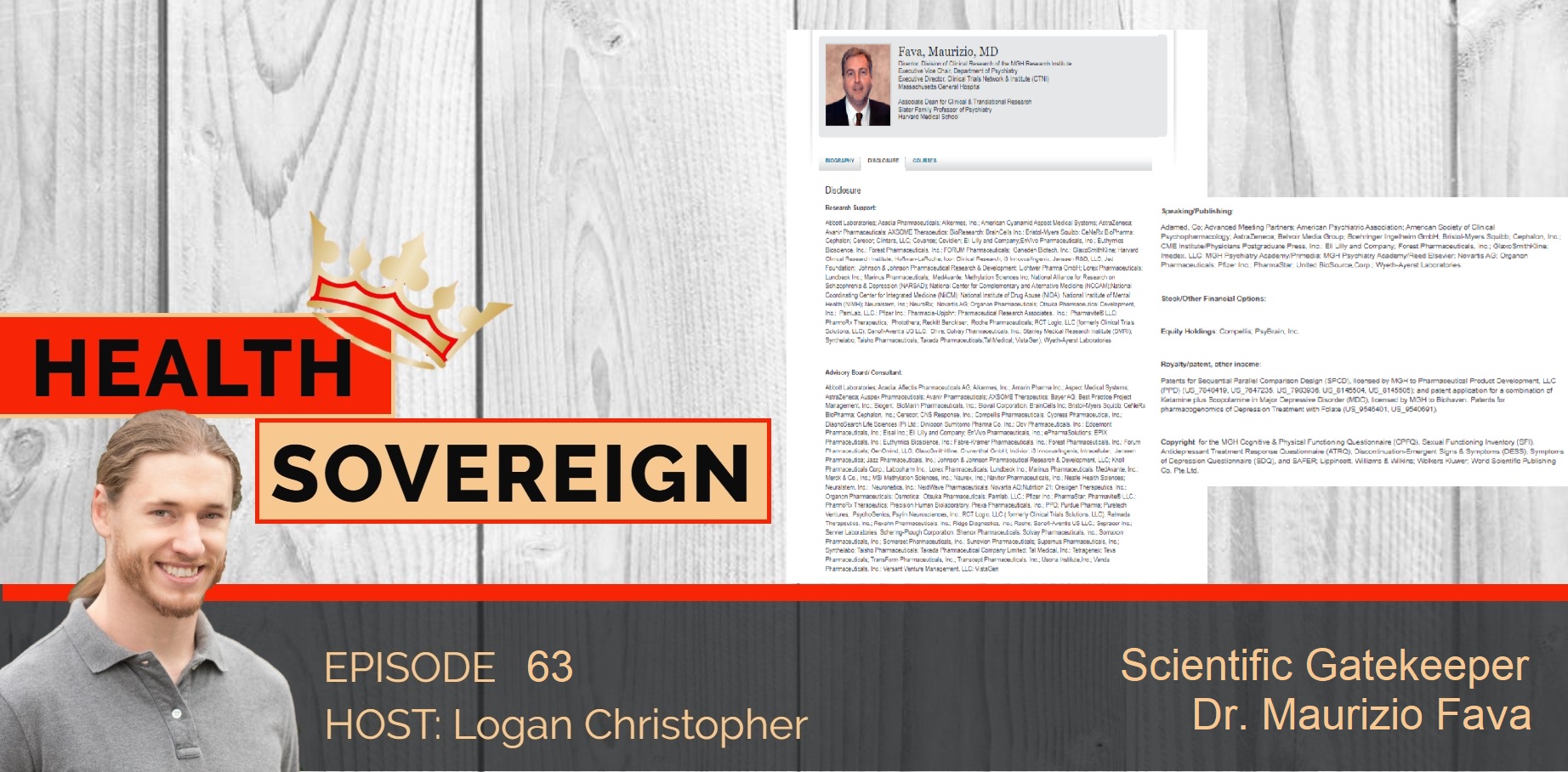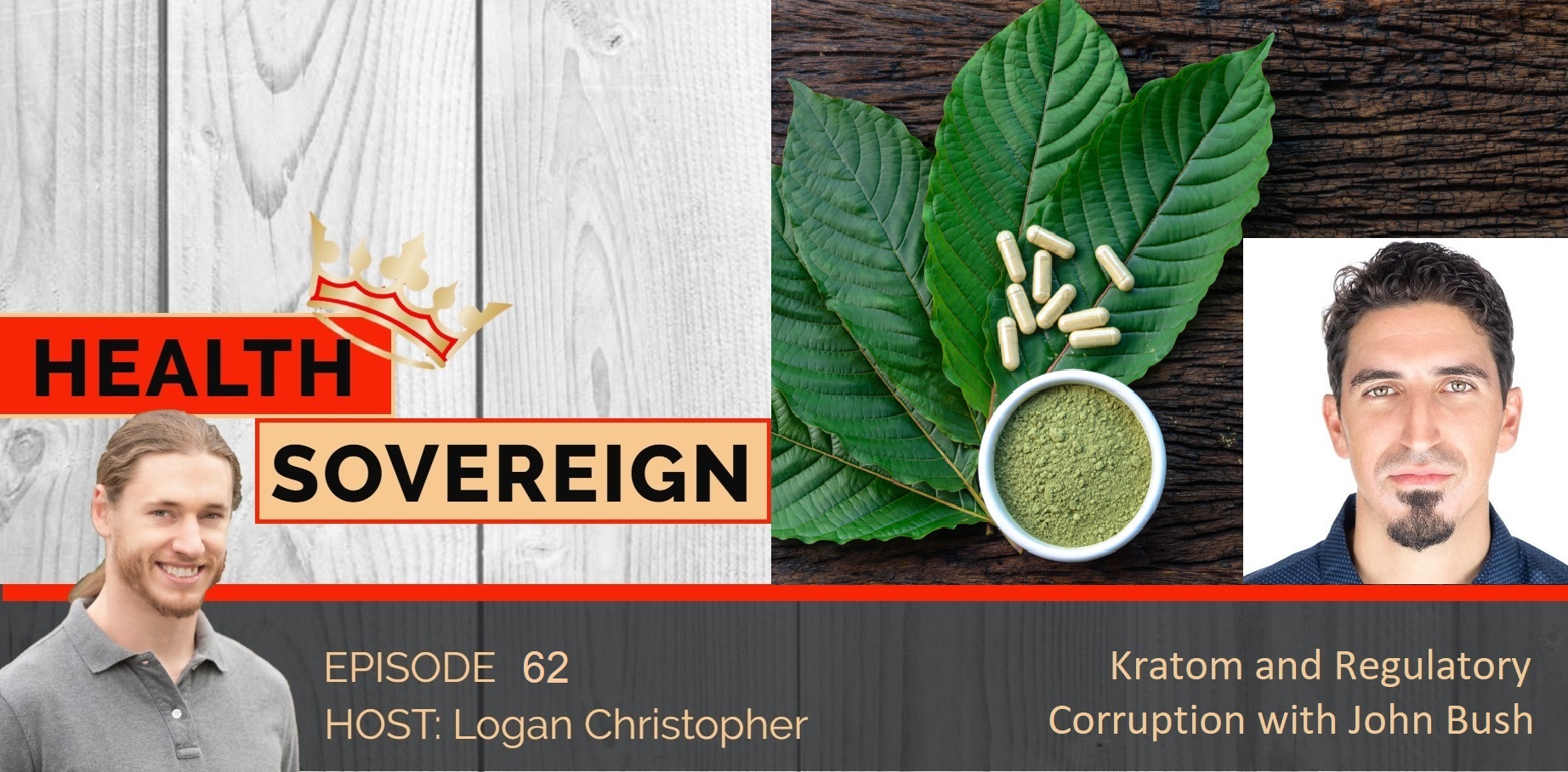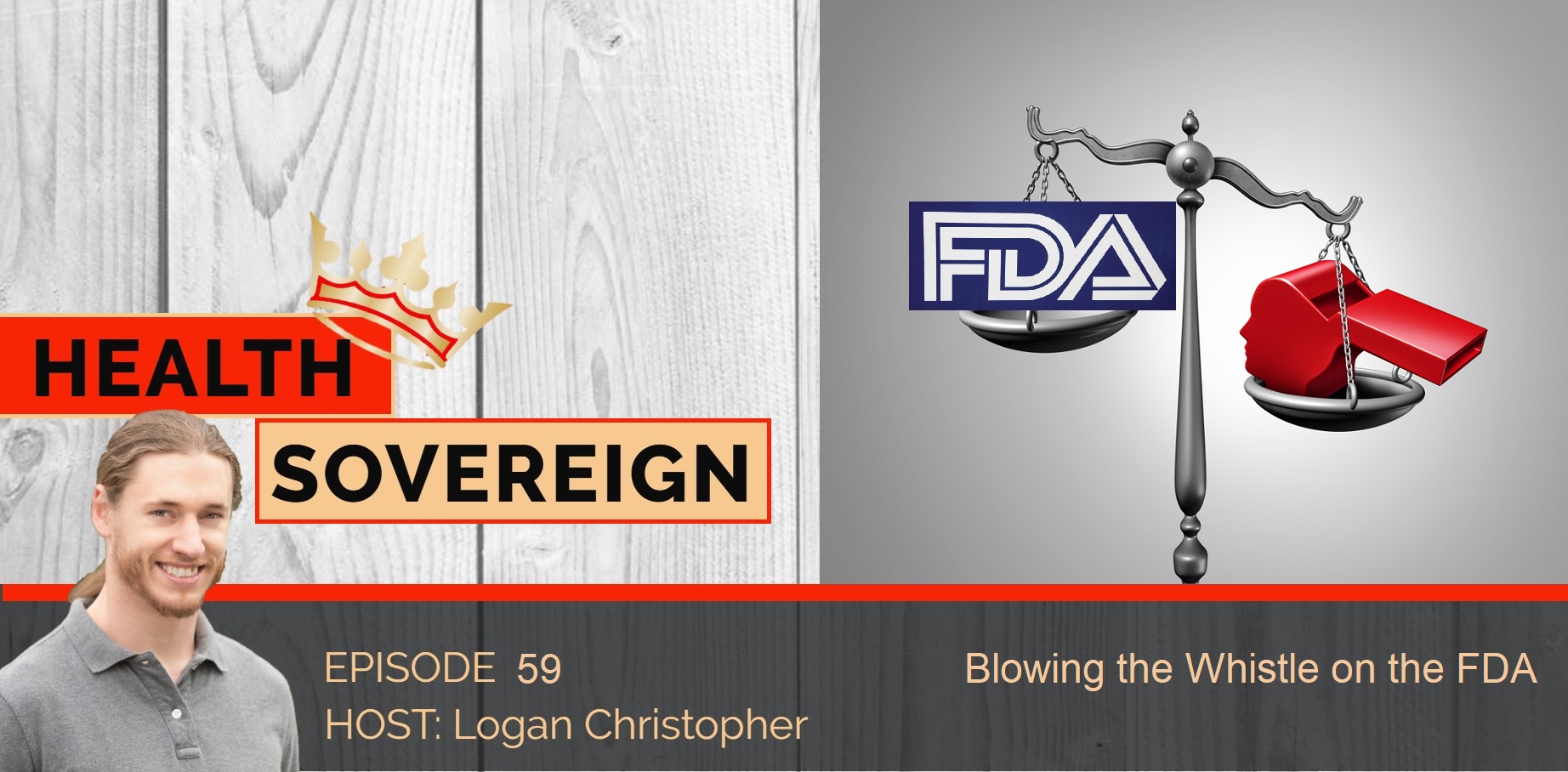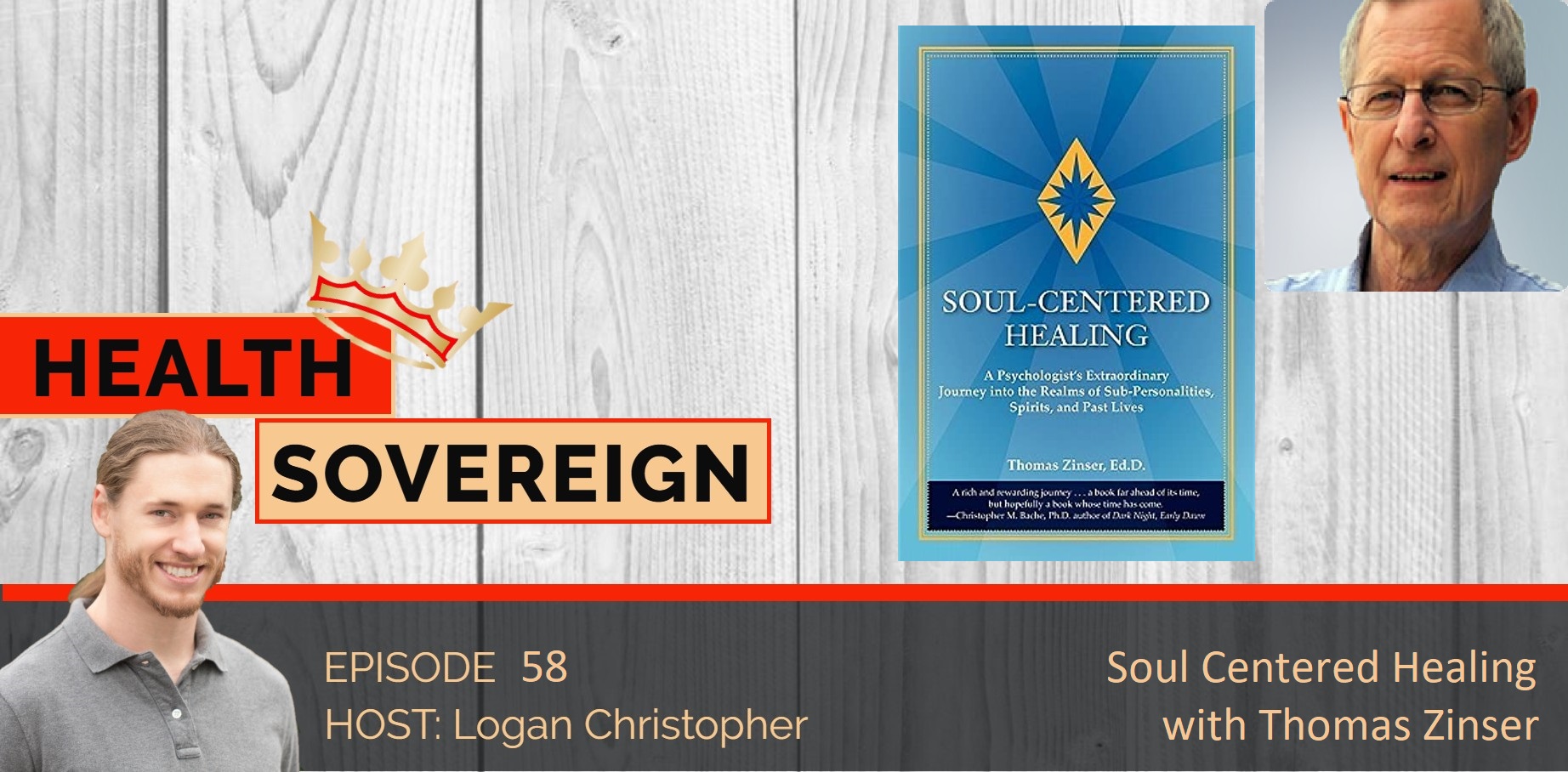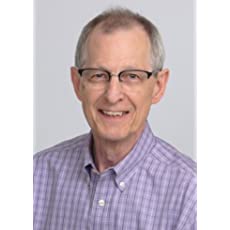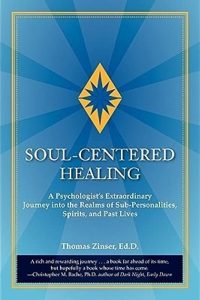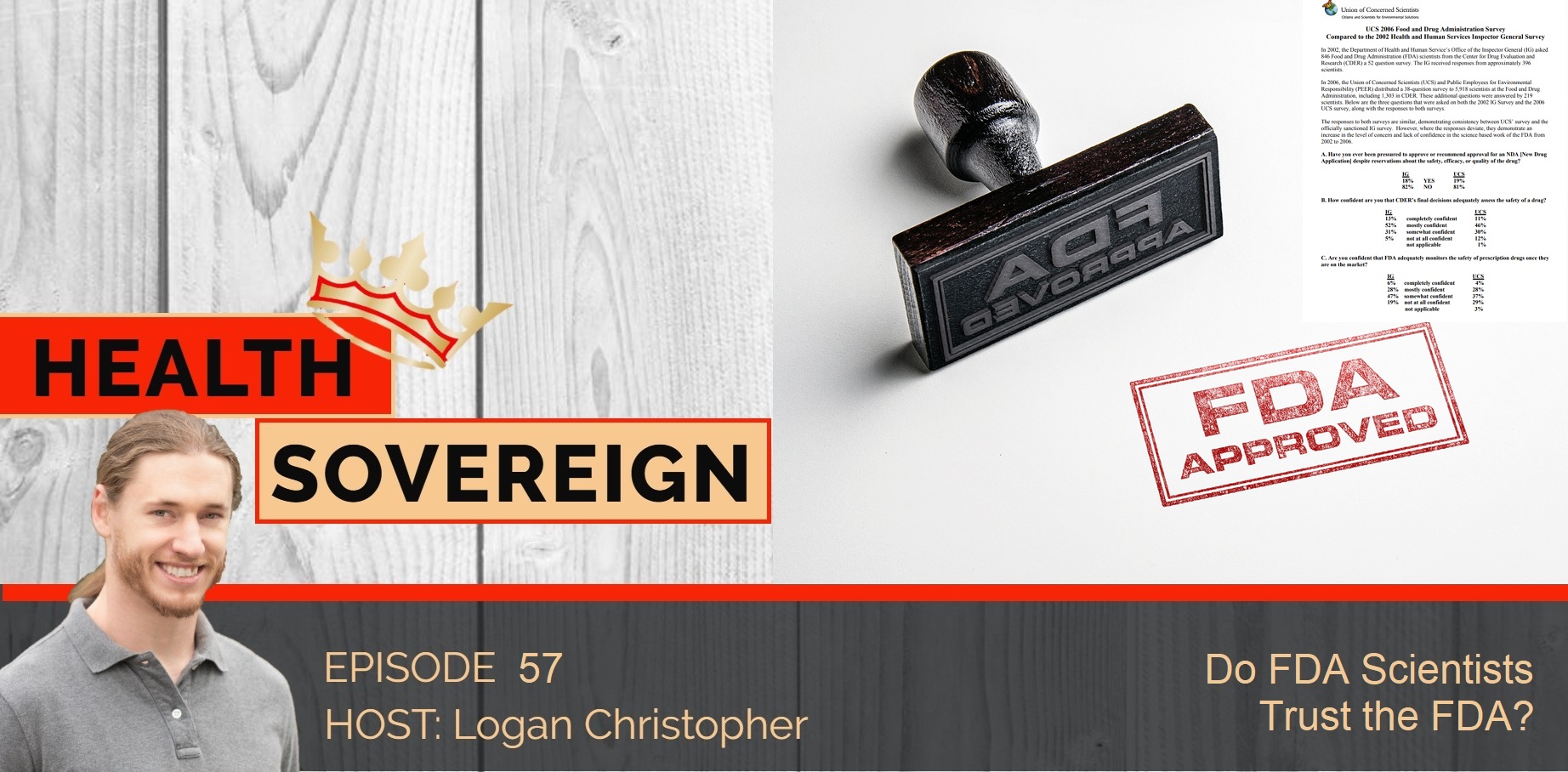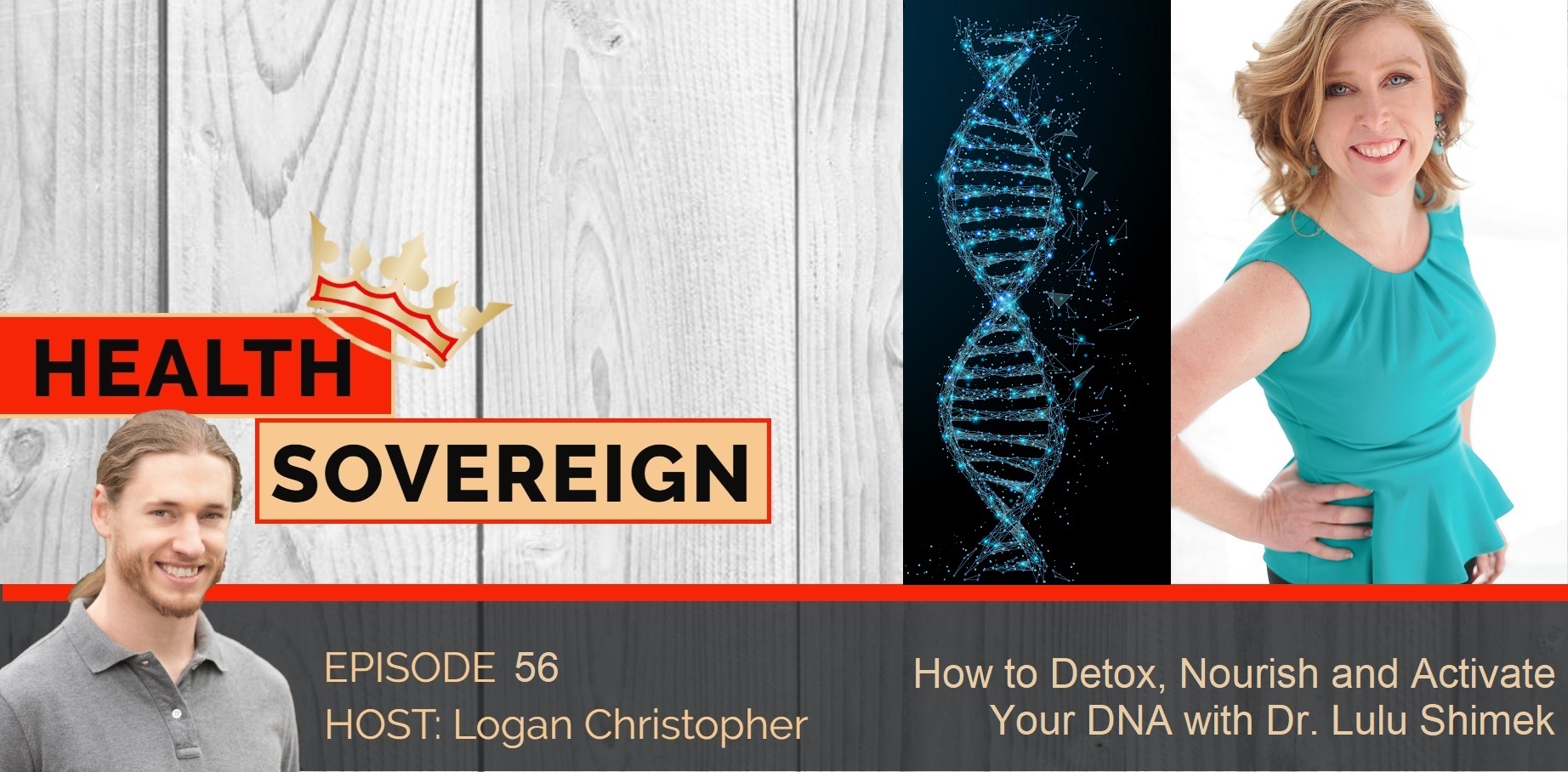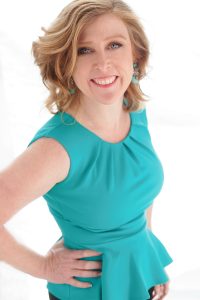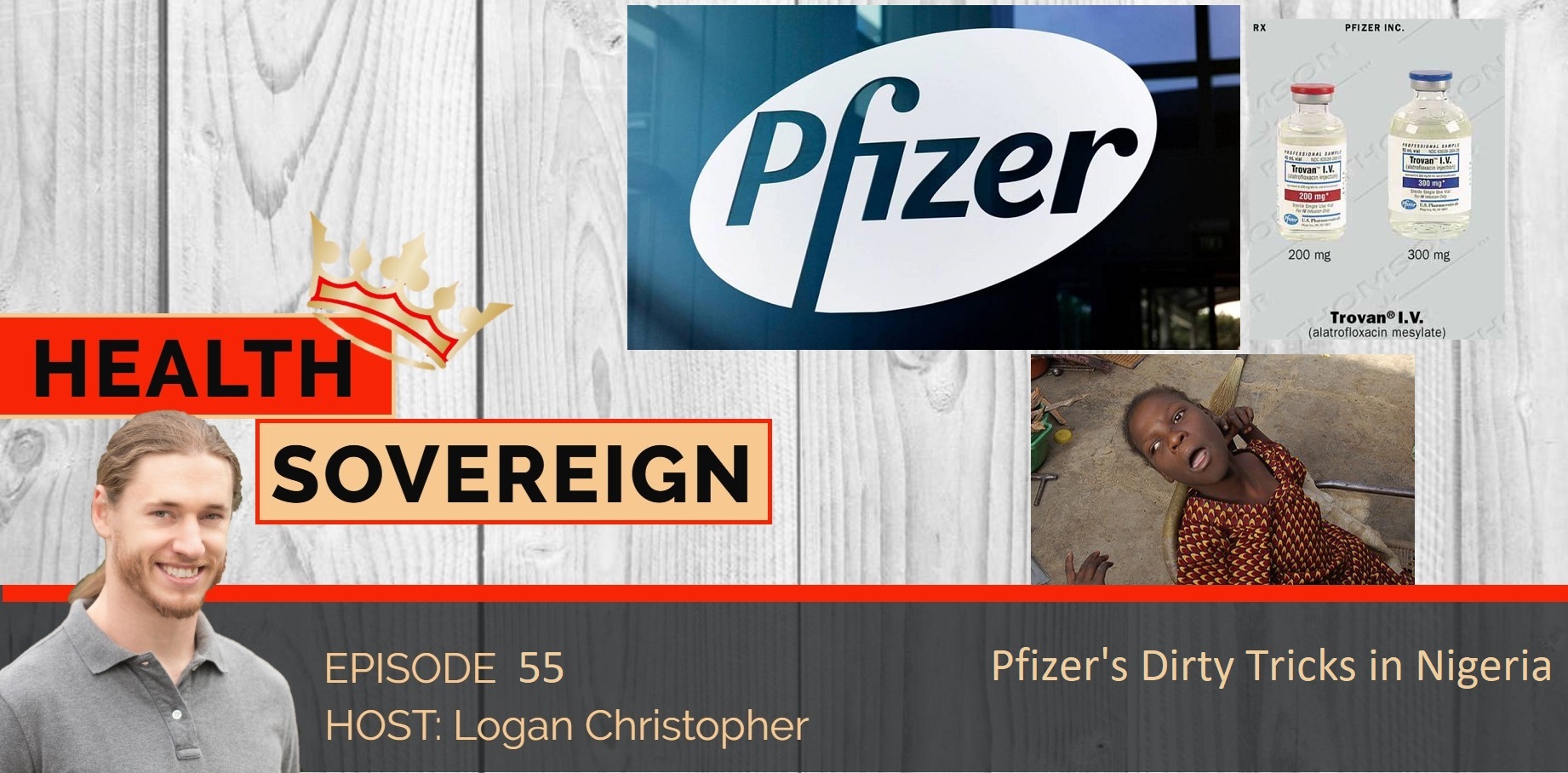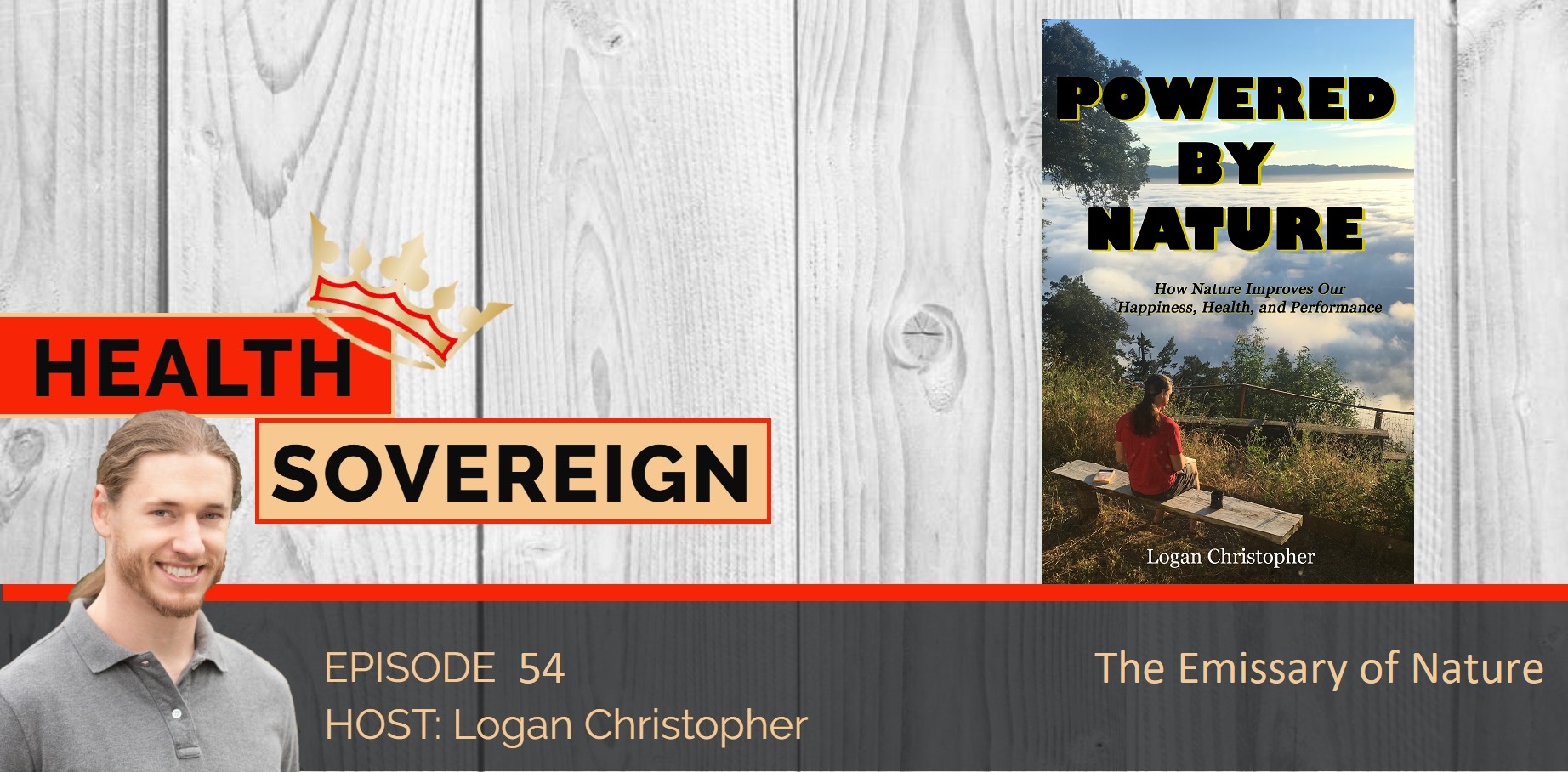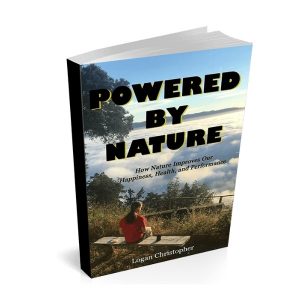Logan:
Welcome dr. Lulu to the health sovereign podcast. Good to have you here.Hi
Dr. Lulu:
Thanks Logan. Thanks so much for having me.
Logan:
Yeah. I'm really excited about this call because I've been diving through the first couple of chapters of your book and going through your website. And I feel there's definitely alignment between what we're do. Some of the things you're saying there really stand out to me. So I guess I want to start just the title of your book, detox, nourish, activate plant, and vibrational medicine for energy mood and love. I like the idea that it's a three-step process, right? There's the detox than the nourish. And could you expand on that and why you decided to go with these three things?
Dr. Lulu:
Sure. Yeah. Well, first of all, the the D the N and the a is your DNA. So we by a coauthor, a Dora one question I really wanted to have something that was about the DNA, about the cellular process. And for us it's re it was just like, so key, so important to really have those three systems address, because when those aspects of the cells detoxifying, the cells activating the cells, nourishing the cells, when those three components are completely in alignment, then your body like sores to a whole new level.
Logan:
So I'm just thinking for people detox and nourish, that kinda makes sense stuff coming in, stuff going out. What do you mean by activate specifically?
Dr. Lulu:
Yeah, that's a great question. So when you're activating the system, you could think of, maybe let's give an example with energy in the book, which is all about the adrenal glands. So sometimes the system will be turned off either because it is a super fatigued or because maybe even the, the actual DNA's not activated. So when you activate it, it's basically like a turning on switch.
Logan:
That's good. So is this related to epigenetics or transposons the, I guess some of those fields that, you know I know you're not like a genetic determinist and so many people still have that kind of the hangover of that kind of scientific paradigm through the word, but really kind of understanding where DNA is right now, scientifically what we kind of more understand about, including how like it shoots off photons and that sort of thing. How does this all play into what you're talking about there with the activation aspect? Yeah.
Dr. Lulu:
Yeah. So in regards to activating the DNA, of course, you know, our, I would say limited study scientifically of DNAs, where we kind of are now. I mean, it hasn't been studied very much. But when we think about it from the energetic perspective, just how you were mentioning the word photon, which is we discuss in the book you know, your DNA or cells are a form of light. They are, you know, and so our whole body is a form of energy, a form of light. So when we activate that light source or that light within the body, that light within the cell, the body's unable to turn on and activate. So the DNA activation process is one part of activating with ourselves within ourselves, the cells. And then also it's about activating DNA through our past planetary life and through our past history that is genetically within all of us, because we have, you know, we had this amazing brain that's massive, huge brain, and also this energetic brain, the mind, so to speak. And, you know, we've forgotten a lot of things as as humans because we've either been asked to, I don't know, forget them on one level or another. And now, so the book is really a revolutionary aspect to activate that past healing energy within all of us on the planet.
Logan:
Yeah. One of the things you mentioned in there that caught my mind and wanted to dive deeper into that science has shown that DNA links back over six generations. You expound on that.
Dr. Lulu:
Sure. Yeah. So, so far they've the, from the scientific standpoint, they're able to link back, let's say an example would be, you know, so you have your parents then your great grandparents, so they can link back specific health problems, right. Whether that's a physical ailment or let's celiac disease might be a good example. Something that's had been in your DNA and passed down, or you have a genetic dysfunction or malfunction. So, but really when we think about it, the DNA is been passed down since the very beginning of time as humans. So I really think it's much, much, much broader than six generations, but, you know, that's what they've been able to link back from a scientific standpoint as of now. But if you think about it, like we're all, we all come from the same cell from one point in time. And so that has linked us through that DNA. And a lot of our DNA is either turned on or turned off because it hasn't been activated or it hasn't been ready to be activated. Does that make sense?
Logan:
Yeah, absolutely. One a case of that, that I'm familiar with there's studies looking at smokers, the grandmothers, and maybe even great grandmothers that the grandchildren or great-grandchildren are more likely to have asthma based on that past activity. And I think as we start to look more at this, obviously it goes wider and wider, but I think that also really speaks to how little we actually understand DNA and yet we're modifying it and doing all kinds of crazy stuff with it now.
Dr. Lulu:
Right? Yeah, exactly. That's a great example. And, you know, you could also think about the Irish famine, you know, back in, does that have nutritional deficiency? That's still connected to the offspring during that time. So there's many ways we connect it back to specific times of history and are we as humans in our family, DNA, our mother and father bloodline then connected back to those specific times in history.
Logan:
So one of the other things that I feel important and I saw it right on your website, I'm like, yeah, you're you get it right. You talk about the root cause of problems. This is so important because most of healing and health care is addressing the symptoms, right? What led you to, I guess, kind of really focusing and identify, cause it seems obvious yet common sense is not so common all the time, but what led you to really like, Oh, we have to get to the root causes,
Dr. Lulu:
Right? Yeah. That's a great question. You know, I think that I began to see when I I've been in the healing arts for a long time, over 20 years, and I began to see that, I guess you would call it like surface medicine, you know, things are being treated on the surface. And when we think of our body, our body goes way deeper than the surface. Right. And when we have something that showing up on the surface, whether that could be maybe a skin is a great example. Right. Okay. So you have a rash. And so where does that rash come from? It's not, it's not, it's from an, an immediate imbalance, right. But what's the root cause of the imbalance. Where does that come from? It probably most likely it comes from the gut because the gut is always that the function of the skin, it's a mirror of that. So I really started to think about and dive deeper into, you know, there's gotta be more than a surface layer. It's got to go way down. And then I, as I went, when I went into medical school, I really started learning a lot more about the root cause of dysfunction.
Logan:
And in your book, you, you focus on three areas, primarily the, the heart, the adrenals and the brain. So you just mentioned the gut and obviously there's a lot of focus on the gut and it's very important. But do you feel the, these three areas are like the most foundational, the most kind of root areas that we need to be addressing?
Dr. Lulu:
Yes. we really wanted to those, if you think about that from the energetic point of view, so in the brain, we have the, you know, it's the, that's the mood aspect of the book, the nervous system. And so from the physical standpoint, that's at the top of our body, that's our communication system. And then from an energetic standpoint, that's our connect connection to our soul level, or, you know, our communication with our inner source or whatever you want to call it. That's our communication on that level. Then we have our heart and our heart of course is our physical aspect of our body. That is our center of controlling circulation. How are things moving, how everything's functioning. And then on the emotional level, our heart is how we open up to everyone around us and ourselves. And then we think of the adrenal glands, that's our energy source. It's also our grounding source where we're connected to the earth. So we have the earth, the heart and the, and the, like the sky or the upper level. So it's those create three places physically are super important for the body, but they're also really important on that emotional and energetic level for having that connection. Does that make sense?
Logan:
Absolutely. Yeah. The way I always look at health is most people focus on the physical, but there's the energetic, the mental, emotional, and the spiritual. And I really tried to think of all those different levels and how they fit together. And even if you have a problem on one the root cause of that may not be on that same level, that that symptom is showing up on
Dr. Lulu:
It. Totally. Yeah. And that's what we were just talking about earlier with the, you know, the root cause of the problem. And when I work with patients, it's not just about looking at the physical aspect. I always look at the, all the other levels. You know, I look at the genetic level, I look at the energetic level. I look at the mental level, the emotional level, cause we all have these different aspects of our bodies that are showing up on another level or the same level.
Logan:
So the gene, Sarah, I'm curious how much of a with your clients and people you work with, are you, are you doing the genetic testing and realizing, okay, you have this gene that says like maybe the, the methylation you're, you're able to process muscle methylation, do that much easier than other people. Do you map that like more physical, genetic level, right. Then we have the up to genetics, which might be a layer on top of that. So are you looking across those, I guess you would say different levels of perspectives, what the genetic testing itself? Yeah,
Dr. Lulu:
Yeah, totally. So I do a genetic testing for, and the epigenetic levels and looking at it from, you know, of course it gives us a lot of preventative information. Just, it's more for an awareness about what's going happen, what's happening inside from that genetic level. And then I also do I work with a system called gene keys. I don't know if you've heard of that before, but it's a more of the kind of emotional level of the genetics. And so I work with those two systems combining together using that physical form, looking at the actual different snips that are going on system and then looking at the emotional and DNA aspect from a chromosomal level and combining those two together.
Logan:
Hmm. Interesting. I've I've heard of the gene keys haven't dove super deep into it. I was curious, especially how it's related to the teaching, which is something that I use quite regularly. So could you please go into a little bit more detail on that and how, how that, I guess why that's working specifically on the emotional level? I'm curious.
Dr. Lulu:
Yeah, sure. Yeah. So the gene keys were developed there, it's such an like an amazing process. I recommend diving into it a little bit deeper on your own listeners and yourself. You can find out some information Richard what's his last name, right? I think Brad, I can't, I lost track of it, but I'll email it to you. You can put it in the notes. So how it works is that the gene keys are divided like, so we have a specific amount of chromosomes and then those chromosomes are then divided into a gene key. And then, so those, so the other 64 of those keys, and then from there, you have the aspects of the body that are related to the emotional level. So you could think about like, what is my purpose? Like, that's kind of like an emotional aspect of the gene, the gene keys.
Dr. Lulu:
And so it looks out of that from that, like you were saying that I Ching perspective, but it's also almost like from a, it's a good way to describe it. Like almost like a horoscope perspective, but it's weight way deeper than that. But it looks about things from the emotional level about why you do things based on your genetic code. So, but that is related to the actual time that you were born the timestamp. So if you look at that timestamp, that's your like energetic times, timestamp your blueprint, right? That's your emotional blueprint. So it takes the genetic code of the emotional blueprint. And then I combine that with a genetic code of your physical form and overlap the two and using my scientific brain and my emotional brain and seeing how I can best help my patients to move out of their place of dysfunction to an optimal place of health.
Logan:
Hmm. Fascinating. Can you give an example either personally or with a client, you know, of course not using specific details, but how the gene keys helped them to heal or have a breakthrough in some sort of way.
Dr. Lulu:
Yeah, sure. You know what I, I like I'll use myself cause that's really easy and I don't know how to specifically use it. But what I really love about working with a gene keys from my own perspective is that, you know, it allows me to look deeper at my emotional body with a different lens because you know, when we're looking at ourselves or thinking about ourselves, we have a, a clouded perspective, right? It's almost, it's like, I guess I do have an, a judgment perspective. Like, Oh, I don't do this because I don't do that. But with the gene keys, it like opens the door up and allows you to see yourself without the judgment, if that makes sense. So you can see, cause it gives things that you're alignment with an, a positive and negative way. So if you're doing like X, X, X, like an act quote, unquote negative aspect that allows you to see why you're doing that, why you have that pattern, once you break through that pattern of negativity, so to speak, then you move into the pattern of that positive realm. Does that make sense?
Logan:
Yeah. Everything has a positive and negative to it, for example, like, yeah, yeah. Addictive personality, which can obviously be quite bad in certain sort of addictions, but also how it kind of fuels me, you know, the obsessive drive, which can be useful though. It needs to be tempered at times. Right?
Dr. Lulu:
Yeah. That's a great example. And for myself, like I love to be doing, like, I would say a bazillion different things at one time, which can have its positive and negative aspects. Right? Like it can be like maybe not so focused or it can be Uber focused. So it talks about those types of things. So that emotional perspective, and it's really, I found it really eyeopening because you're like, Oh, that's why I'm doing this. It's because, you know, it's related to my genetic code. It's part of me, it's part of my blueprint. Oh, that totally makes sense.
Logan:
Yeah. I noticed that on your, I believe it was your bio, you talked about yourself as a Renaissance woman and I certainly am to be a Renaissance man. And it's, it's both a blessing and a curse, you know, it's like, Oh, if I could just focus on one thing, I could go so far with that, but I feel the need to go so wide and diverse in everything. So I resonate with you there.
Dr. Lulu:
Right? Totally. Yeah. I work at I always like to think of myself as working, like at the speed of light, you know, like so fast doing many different things. And so I can, I feel like I can get things done in one day, which I would like take most people much like a longer period of time. I don't know. I feel like I function in a different time, time continuum or something like that.
Logan:
Yeah. Oh yeah. So it's interesting. And this is part of what we're talking about there, but, and I see a lot more of this in other people I know in the healing arts, it's, it's a bridge of the scientific, the, you know, like rational mind with the more energetic, emotional everything. And I, I, I hope we are moving toward a future. Things are more integrated in a way that can support us on all those different levels and perspectives versus this, you know, just straight up materialist reductionist paradigm that we've been going through in the past century or so.
Dr. Lulu:
Yeah. We're definitely moving in that direction. I think one, people are becoming a lot more open-minded they're being activated. Right. as I was talking about before they're being activated to open up specific areas that have been, you know, we, in our history, we have had a lot of times of being persecuted for specific beliefs and we're still going on today. It's not like it's not right. You know? And so with the
Logan:
Whole pandemic and everything,
Dr. Lulu:
No. So we're seeing people being able to have new perspectives with an open mind and not feeling persecuted, which I think is part of the development or the what's the, like what a better word would be the openness and availability for people to have more awareness of the shifts in our, in their, in our medical system, because it's a failing it's, you know, of course like we need to have some kind of emergent medical system in place. That is totally great. You know, if you need, if you have an emergency, you need to be able to have something, someone there to help you. I worked in the ER, I know all about that. But then also when we're talking about from the chronic disease standpoint, we've got to have a different model. I mean, it just it's. Yeah. And that's what I mean when I'm saying that it's shifting more people are being more open-minded the medicine itself is shifting and being more open-minded.
Dr. Lulu:
So when we can have those two avenues be like, you know, coming onto the same path, we're going to see this huge shift in our medicine and we're on the cusp of it. I it's like, you know, it's already happening with all the healers around the world being like, okay, look what you can do if you do this. And there's so many different ways we can heal the body. It's not just like one, like as, from the medical perspective, the MD where I was like, take this pill and you'll feel a hundred percent better. I'm like, that doesn't work that way. Right.
Logan:
Yeah. Just did an article of like, there's a hundred healing modalities and really are our places to find the proper place of those. So, you know, I, I'm not, I don't want to see a crystal healer. If my arm gets ripped off there, I want to go to a real medical doctor, you know, use drugs to help with the pain, reattach the arm, that sort of thing. But yeah Western empty is not going to help you figure out your purpose in life, which we can think of this other level of healing. Right.
Dr. Lulu:
Right. Yeah. And you know, just to say, just as a comment of what you just said, I actually think that you do, when you have an acute thing, like you, where you broke your arm, or you have a really big industry, you actually want to have all those other healers on your team too. You want to see the acute person like okay. Right. Yeah. And then from there you bring on all the other healers, wherever that those modalities are, there's so many to help you have a different level of healing, so you can help deal with the trauma, the physical, the emotional, the mental trauma and help your body heal quickly. Okay.
Logan:
That's right. Cause yeah, I think that's an important point that with any sort of physical trauma that it's not just physical, right. You're going to have this other related stuff. The, although the Dr. May, you know, address the bleeding or whatever at that time, which is of course very important. You have to work with those layers to really get the full and complete healing. And there are other better modalities for that.
Dr. Lulu:
Yeah, totally. A great example. I had a patient who had recently had a car accident and, you know, the actual, like mental aspects and the emotional trauma we're way, way, way bigger than any of the physical aspects. You know, and because a car accident can be very traumatizing emotionally, right? It's like, you can be hit out of the blue. You have no, you're not aware of what's happening. You can go into complete shock, you know? And so dealing with the emotional level of illness is just as important as the physical level.
Logan:
Absolutely. So speaking of being open-minded, you know, I don't know where all my listeners are at a feel. If they're listening to me, they're definitely somewhere on this journey, but I call myself a recovering materialist cause I certainly came from that frame long time ago. But with something like crystals healing it's funny, cause I, I didn't want it to be like useful or true. Like I, I fought mentally. I just, from wherever I pick this up, I didn't want it to be true, but I could feel things like I can feel energies reasonably well, how know how to really qualify that. But so then when someone was actually like working with crystals on me, I'm like, it, I can feel something like it's working. So it was a weird,ukind of mental, emotional battle going on in, in me.
Logan:
But something you said in your book, that was a really interesting triggered. I remembered when I was a kid, I used to collect rocks and stones. Like I would go to rock shows and I'd never actually thought of that. And it's like, Oh, you know what? There was something back then that drew me to them. And you know, I got inculturated in this way that, Oh, that's all stupid stuff. And now I'm thinking, Oh, I need to like revisit that. So can you speak to crystal healing fits in, in that I guess that whole framework of detox, nourish and activate.
Dr. Lulu:
Yeah. That's a great question. Yeah. So within the book there are 11 interventions that are given for each of the systems. So the brain, the adrenals and the heart, and then detox, nourish and activate. So there's nine photon wheels. We call them within the book and the crystals or, and stones are one aspect of the interventions there.
Logan:
And
Dr. Lulu:
A great way to think about stones. Like you said, I love how, what you said about collecting them as it, when you're a kid, you know, when I go out hiking which I do a lot, always pick up a stone and put it into my pocket. It's like, there's a, it's like a little star on your path. You know what it's like? So, you know, who knows what it's going to be? You know? Cause when you're out in the woods, there's all kinds of different stones, right. But even those stones have some kind of energy and it can be hard when you're first working with stones and crystals. Like you said, to be able to one maybe to like believe that they work or to, to resonate with them. So what I recommend when, you know, our book is a great way to work because we give the energy around the stone, what the, the basics Stone's good for.
Dr. Lulu:
And then we also give a placement of the stone. So one thing that's really easy to do is just to place stones on specific areas of the body for healing. Like the heart is a great example using you know, like Rose quartz, because when you feed, you can play stones on specific areas of your body, which then helps the body to detox. So letting go of like emotions or physical disturbances or nourishing the body, bringing in energy that the body has been depleted in or activating the system, turning on the system or energizing the system and crystals do that through vibration, through energy, through photon. Does that make sense?
Logan:
It does. So. Yeah. And that's a very interesting w I guess my question where, what is the best I was talking about the proper place of all these healing modalities. So how would you, I guess, categorize crystal healing, where is that most useful? Is it like for the, the mental or the emotional blocks, the energetic body what would you say it's most useful for?
Dr. Lulu:
Hmm, well, you know, that's interesting because I actually think they're good for all levels, but I think it really depends on kind of what you're looking for, what your like game plan is like, you know, what's your end result. So let's say for instance, I was talking about the heart. Maybe you were having some aspects of the heart on a physical level. Maybe you're even actually having some issues of high blood pressure. So using stones and crystals on the heart can help to regulate blood pressure. If we're looking at it from the emotional standpoint, it can really help to open up the heart help to bring awareness to areas that you've had maybe heartbreak or loss, or maybe you have problems when it comes to self-love. So there's a lot of things about the emotional level and mental level I think crystals can help with, but I would think more on that, on the vibrational level with the physical being and the emotional being is where you can really feel him and really feel the difference.
Logan:
Yeah. It's a, the Rose course you mentioned, is that what that would be useful for blood pressure or is there another stone there?
Dr. Lulu:
Yeah, I do actually like to use Rose courts a lot with blood pressure. One reason with that is because the Rose quartz is it's a very powerful stone. It's also an stone I'd like to use patient ones with patients where they can, they're easily accessible. And like, you know, you can find them easily because stones are more rare, right? So yeah, sports is great, but it also is really powerful but subtle. And when it comes to blood pressure, we want to use kind of stones that are making easily easy adjustments in the system, because you don't want to have like this massive change in blood pressure from low to high, you want to have it be like slowly regulating. So I love to use Rose courts for that. And you can really easy ways you can do it. You can wear it around your neck as an ambulant.
Dr. Lulu:
You could put it you know, where, when I w I'll have patients put, like, have a little pocket, you know, like a sh t-shirt with a pocket and you can, so it close when you're sleeping, it's a great to help balance your blood pressure and circulation while sleeping. You're not a large stone, but something small. And so, you know, smooth. But that's another really great one too. Or you can have take a bath Rose quartz is great to put in the bathtub. You can take an Epsom salt belt bath to help the muscles relax, and you can lay the Rose quartz in the bottom of the tub, and that really helps the circulation and helps your body to relax.
Logan:
Hmm. Fascinating. And I'm going to have to experiment some more.
Dr. Lulu:
Yeah. That's what it's all about. Yeah. Totally having fun. And exterior name was stones. That's how I first started using them and theirs. And I'm definitely, I have a ton more, I don't want to learn about stones cause there were so many. Yeah. You know, we have like most people know, maybe a common, I don't know, 12, but there's like a bazillion stones on this planet and crystal. So you know, there's, we have resources in the back of our book that really give great books that people can buy and purchase for more information, if you're looking to go down that route for sure.
Logan:
Hmm. And one of the thing you, you mentioned, and we should definitely talk about this subject as well, but having the relationship with the plants, but I'm recognizing it's the same sort of thing with the stones and you were saying hiking and picking up a stone, but also then working with these, you can really kind of establish that relationship to a rock, which, you know, to some people that's going to sound like a pet rock thing, but I I'm after results. Right. So as I said, when I had like, I didn't want to believe in crystals, but then I felt things happening with them. So it's like, okay, I got to go there. Right. Cause I'm interested in results. And yeah. And I think another thing with the hundreds of different modalities is find the ones that work for you. You know, crystals, they may resonate with us in rocks and everything, but it might not be right for another person. But the, I think the important lesson for people as a take health back into their own hands, something that's very important with you know a board of advisory sort of is to find those modalities that work for you that resonate with you. I think that's important. Yeah. Is very
Dr. Lulu:
Individualized right in, which is, I think when we were talking about earlier about the place of medicine on our plant, not working very well it's cause it's not individualized. You know, we are individual people. We each have our own set of DNA. We each have our own cells and how our body works. And you know, that also differs from day to day. When I work with patients, I see them really frequently because you're, they're shifting. I want to help them to shift quickly. Like, you know, if you're, if your food is a great thing, you know, a lot of times people need to have some things taken out of their maybe nutritional plan that aren't working. So great. You know, maybe you have a gluten allergy or something, but also, you know, you might need specific foods from a day to day basis or week to week basis, month to month basis, year to year basis that are completely different.
Dr. Lulu:
You know, rotate it up, have fun with it, you know, like eat something, listen to your body. So when it comes to individualized healing, listen to your body, explore what's out there. Talk to your friends. I mean, there are so many different things like, you know, and try it out, see what works if it works, you know? And then you're like, Oh, remember when I like, you know, a great example would be when I was going to medical school I had read something about last year university. Like I don't know, a long time, even before I went to school. And you know, that's how I think that healing is. That's my point is that you have a spark within a year. Right. It's like something. And then when that spark is needed, it gets reactivated. Right. It's like, Oh yeah. Remember that person, that acupuncture is that, you know, Susie told me about, you know, that's the kind of thing it's like when we need it, it's going to be there for us is my point and not to ramble.
Logan:
Right? Yeah. Yeah. I think a synchronicity and following that golden thread is a important part of healing. And it's just more fun. Right. You know, to have like a magical worldview in that sort of way, that luck from the universe and your healing path is unfolding rather than once again, like a reductionist materialist frame mindset, like that's boring. I want to have fun. Right.
Dr. Lulu:
Have fun. And that's a big part of our book is we have their discovery dives throughout the book where you, as the reader are given the tools to discover the healing deep within yourself. And that is the, like the revolutionary part of the book that we really wanted. We wanted it to be a discovery within where people are just like, you know, there's so many books about like self-help out there, right. But people need to be given the tools to look deeper, to have the things around them herbs, crystals, essential oils, food meditations, all these things that are accessible that you can experiment with. Right? Like, Oh, what is this stone? Or what is this herb? I don't know anything about it. I'm going to try it out. And that's kind of a lot about what the book is like, you know, you have this, this trauma within you, what tools can you use to help explore it deeper?
Logan:
Let's talk about herbs and plants a little bit and relationships with I don't really, I guess, a good place to start with this. I know you have a lot of training best dear university is a well-known herbal school. My, my primary teacher in, urbalism say Depop him. He, he trained there. So I'm familiar with it though. I did not personally. What I guess really drew you into the plant path.
Dr. Lulu:
That's a great question. What drew me to the plant path? Hmm. Well, I think that, that would be when I was a girl young child, we had a big garden in our backyard and I was just able to be with the plants and love and explore being a gardener, you know, and plants, not just herbal medicine, like a button, like a medicine, but food is medicine. Right. So I think I really started to have a love of being in nature. Like nature is how I discovered plants, food herbs, like, and I, from a very young age. And then as I grew older I started working more with food specifically, not in the beginning. And then from there I started working with healing with people on the physical level doing a lot of bodywork. And then I went back and I was like, Oh, I started learning more about herbs and learning about how they can be, they are healing. They are medicinal and how using those can affect the body. So I guess it was kind of, it's kind of like a roundabout kind of way, but just learning different ways. But really when I was a child, just that love of nature. Cause my parents were really into the outdoors
Logan:
Slowly. Yeah. I noticed you have the Paracelsus quote on your website. The art of healing comes from nature, not from the physician. Therefore the physician must start from nature with an open mind. It's beautiful.
Dr. Lulu:
Yeah. It's so true. You know, nature is the mirror of healing when we, you know, if you, I was walking, hiking outside this weekend. And I just, I love being outside by myself and because it really allows me to have a different view of the trees around and I was just walking and I like to, this is really silly, but like, I love you tree. And then I'm like, Oh, I love you tree. I love you leave a hug. Like, and I, I really liked it cause it, it, I don't know. It's like this connection with nature helps me to feel a connection deeper within myself.
Logan:
Right? Yeah. I, some ne of our health problems are especially the chronic ones are a result of disconnection from nature, which we humans. I mean, this is what I talk about in my book powered by nature, but we, we sought to control nature and there's obviously some legitimate reasons for why we did that. Not to say everything in nature is great, but the, the more we've driven ourselves from nature the more we are suffering, the consequences of doing that and that I feel health is our birthright, right. That it should be natural and pretty easy. And if we do things in alignment with nature, then I feel that it's relatively easy to thrive.
Dr. Lulu:
Yeah. That's so great. That's so brilliant. Yeah. And you know, we didn't come to this world to suffer that. Wasn't why we chose to be here. We, I mean, I don't think that any of us chose for that purpose, you know, we chose to come here to enjoy life, to have fun. Then something happens along the way, like the bump in the road. And our belief system changes. Or we forget, like you said, we forget about nature and nature has so many different similarities to how it helps the body. Like you can think about the Walnut, right? Like the Walnut is is, it looks like the brain, like, of course it's going to help our brain. And there's different herbs too. Like we have like Gingko, how it also looks like the brain. So there's different things in nature that when we take the moment of actual, I dunno, a moment, not a moment of silence, but a moment of like clarity, a moment to just be with nature, we can see the light bulbs go off.
Logan:
Right. The doctrine of signatures. Could you speak to, I guess, what are some of your, your best friends in the plant world we're talking about relationship? Like not, not what are the best ones, but yeah. What are, and whether this is something you use as a medicine for yourself or whatnot, or just hanging out with that plant in nature. Yeah. What are some of your best friends that you think more people would be? It is full for them to establish their own relationship with these.
Dr. Lulu:
Yeah. You know, that's a great question. A lot of people ask me sometimes like, what's your favorite herbs? I'm like, Oh my God, how am I supposed to choose a favorite? But yeah, I do have my little friends, my allies, and I think that's always changing. So let's just be in the moment. Like what I was using today, I think is a great example. I've been using cinnamon a lot, you know, we're in the fall and winter season time, and I really love cinnamon for its its sweetness. And it has also, that's like from the the herbal perspective, it has, you know, when you taste it, it has the sweetness, it has the spice, it has the energy. It's also really a great metabolism booster. It helps the body to detox. And we think about from the aroma therapy from that essential oil perspective, it's so great for the immune system.
Dr. Lulu:
It helps clear the air it's revitalizing it's spicy. So it, you know, cinnamon for me just today, I've been, I was put it in this little detox drink that I made. And it helps me connect with the time that, that that of now. And so I think when it comes to herbs and allies, I like to be in the moment. So cinnamon was a great one. And then I've been using tumeric a lot. I love the yellow quality. I think, you know, yellow, when we're talking about the energetic system is all about empowerment. That third chakra is really, really coming into your power. And I've been working with that with myself, a lot, really stepping into that place. And it also really increases this like beauty of connecting to India and dually, which is happening right now. And so for me, it's like this combination of what's happening in the moment, like within myself, what's happening with that plant what's happening in the time this season what's happening with what my body needs what's happening with around the world. So there's lots of different components there for me to choose from. That's very nice.
Logan:
I want to, I guess, jumping a little more, but open-minded thing we, we talked about how the genetics are related to obviously going back in time, your parents, grandparents, ancestrally, but then there's also this past live component. How is, I guess, first of all what led you to believe he knowing that past lives are a real thing?
Dr. Lulu:
Mm [inaudible] that's it, that's a big, powerful question. Isn't it? Well, okay, so this is a, this is a great answer. I think that I can give for about myself. So I was having all of these like pretty powerful nightmares where I was waking up and I like abruptly out of sleep feeling like the house or where my, like, everything was on fire around me. Like I could wake up and like smell, smoke intensely. Like I would be like, you know, and so I started seeing different healers to kind of like figure out what that was, what that was about. Like, I'm like, there's gotta be something going on if I'm having this smell of fire, waking up all the time. And so I had some different readings done specifically and one of them was, well, actually most of them came back to the point that I've been a librarian in many times in my lifetime, which totally resonates with me about having the the knowledge and the power of books and the history of books and like being, having to be being the protector.
Dr. Lulu:
But then as you know, through our history, the burn, the books have been burned. Like the libraries have been burned, you know, and so who I just got goosebumps. So part me, I would have been, have experienced that in my past life of being that protector, being that fire element. But, and I it's like being has been reignited within me, which is why I like have that connection that I'm like that, that like moment in time where something is going through my system, where that I need to remember. And that's what I feel that's where I get that connection of that past life is like from that smell of smoke, from that feeling of being like in a fire, I actually am downloading information from my past lives that I need to express out into the world, through the power of books, through writing, through getting my voice out there
Logan:
Right today we're facing, I like the term bit burning more than book burning, but the censorship going on, it's very fascinating to watch that unfold and how quickly it's moving.
Dr. Lulu:
Yeah. We just have to be, you know, be who you are, be free, be tried, you know, express yourself and try not to feel the limit limited the limited list. No, the, the limit of who you are and helping to shift, because we that's, our only thing we can do is just help to be in this space to help move the planet forward. Cause other people will just take the wayside hopefully.
Logan:
Right. So my wanted to start with that, to ask this question so DNA being the blueprint. Obviously we have the science of how that comes from the previous generations, but I guess how our past lives tied into that blueprint, how does that work from your knowledge base?
Dr. Lulu:
So you're talking about from where just to, I want to clarify, so I can give you an answer. So you're asking where the past live blueprint of the D goes into our DNA. Is that what you're saying?
Logan:
If that, if indeed it does. Yeah.
Dr. Lulu:
Yeah, sure. Okay. So yes it does. And the answer to that is too. So our DNA let's talk about it from the light perspective. As I was mentioning a little bit earlier, our DNA is a form of light. Okay. and in our body, our bodies are just physical forms of light that we have in a shell of a physical body. So we have millions of light forms within us or cell light cells, light photons, DNA, moving within us that are activated in our physical form as we are in this moment in time. But this, the DNA from our past lives is still within us because it on the energetic and emotional form, it has always been within us. It is always there as we move forward, it is what is our purpose. It's what allows us to be who we are. And we've chosen that DNA to be who we are in this moment.
Logan:
Hmm. Could you explain more on DNA is like, I'm just trying to better wrap my mind around this.
Dr. Lulu:
Right. I know. Yeah. you told me to go way out there. I'm going out there.
Logan:
Yeah. I'm enjoying it.
Dr. Lulu:
Oh, I'm sorry. What was the question?
Logan:
DNA is like, can you explain more how that works? I guess
Dr. Lulu:
I know. Yes. Okay. So let me see if I can explain this in an easy way for, okay. So let's, let's think about a Ray of sunshine, right? So when we look out into the yard, right, we can see, we can see a Ray of sunshine coming down through the clouds, for instance. So that is a form of light, right? And it has energy. It has, it has a photon, it has a movement. So our DNA is that vibratory aspect of light. So within that, like when you think, okay, let's look at the leaf of a tree. This is so on that leaf. If you look through, you can see the veins of the tree, right. You can see the, all the aspects of the tree. You can see the little, little I don't know. It depends on the leaf, but you can see the areas where water might be sucked in, or you could see a thorn for protection.
Dr. Lulu:
So within that leaf, there are rays of sunshine, right? Photosynthesis. There's a rays of light moving through that. So that light is the cellular DNA of that plant. Right? And so it's, it's, it's how the plant works is how the plant communicates, how the plant does everything. It's the same within us. It's the same cell. It's the same DNA. When we use a plant, when we eat a plant, our ourselves know that energy form, we're able, that's part of the healing. We are able to connect back to that plant back within us, back to that knowledge, back to that past life and use it. We just have to be open to it. So the cells are, I know it's a hard process, like thought process, but the cells, the DNA is like a, it's an energetic form of light within the cell because the cell of course has many physical components, right? It has the nucleus, the golgi apparatus. It there's the mitochondria, all of the aspects that make the physical cell work. But we also have a light cell. That's, that's a better way to describe it. I think so within the nucleus of the cell, we have the DNA, right. We ever, did we ever RNA or DNA, it's how the cell functions, but we have our light DNA. We have our energetic DNA. We have, that is the light part of the cell. That is the vibration of the cell.
Logan:
Okay. Yeah. That's just, yeah. Percolating in my mind there. So thank you for that. Yeah. Well, yeah, it makes sense. Right. I mean, all the plants with, through photosynthesis, they're, they're capturing the sun and that's transforming and allowing growth and everything. And then, I mean, everything that eats everything else, right. It's just a biotransformation of that. I've also heard DNA described as a antenna, right. Which it can both receive and be emitting the photon. So it is that kind of, I guess, energetic architecture. That is and so that makes sense. I mean, especially when we see just how much, like our DNA can fix itself and transform itself, it's not just random mutation generation after generation. There's all these other things going on, which, you know, it's, it's explained, it's just not well-known or I guess elements of it are known like, yeah, we're still in the infant.
Dr. Lulu:
Not it's been studied necessarily, but it has in other forms. Right. Because it's like, what I'm saying is I'm taking all the, like the forms that have been scientifically study, but I'm asking people like, look at it kind of like in a different way, so to speak, right. The scientific aspect and the energetic component, because we can put, we've studied energy. We've, you know, one aspect we've studied energy and we can, but now I think it's like the science, the energy, the components are all coming together and clicking like the linking of the DNA.
Logan:
Yeah. The, the analogy that's coming to mind is like, we have a physical body and we have energetic body. Like, let's say the, the aura, the different energy system bodies, but you can have that physical structure of the DNA, but also that the energy DNA that is around that. So it's, it's operating on multiple dimensions. Right.
Dr. Lulu:
Right. Yeah. I mean, we're not a one dimensional being, it's just not, it's not possible. Right. We there's two there's this, we, you know, I think some people are still functioning in that one D world or the 2d world, or, you know, but we are definitely not that. I mean, w there's just, there's so much out there to show us that we're not that. And so I think that's what, when people are start, will start to open their minds, you know, listeners out there open your mind to the possibility that our DNA is not one D it's not, you know, it's way more dimensional. And we, when we access that DNA through the interventions, like we discussed in our book through meditation, when we access that DNA, there are, we're able to like shift so many things in our body that we've never been. It's like the key, right. Unlocking the key to the door that has been locked for a long time.
Logan:
Right. So we're coming to the end here. I have to ask this question as I've gone along in my own healing journey and by no means, am I done, but I feel it is becoming less personal and more transpersonal. Like some of the healing processes are not just involving me. So I saw on your website that you facilitate ceremonies to activate plant and mineral connecting points around the world to elevate planetary consciousness and community. Can you speak to that idea and also this idea of like trans personal healing?
Dr. Lulu:
Oh yeah. That's a great question. Okay. So one aspect of it is I like to think about, you know, we have the worldwide web, right? Well, our plant city is that, so when, so my purpose and intention is to go around to different places on the globe to help the plants and the communities to reconnect that healing around our planet, because that's part of it as we, you know, that's the healing that our planet needs to. So that's kind of like the, the interconnection. So offering ceremony at different places around the world helps the plants to be reactivated. It helps the people to be reactivated. It helps them to find the community that they so need for healing. And then the other part of your question was
Logan:
Transpersonal healing. So I guess, yeah. Moving beyond ourselves in, I guess these practices and healing modalities.
Dr. Lulu:
Yeah. I think moving into group healing is really our next wave, especially because we're moving into this, you know, since the pandemic we have seen that we can work in a much more you know nonphysical place. We've seen it happen. I moved my practice to a hundred percent telemedicine where I'm working with patients virtually. And so when we think about that interplanetary connection, that interpersonal connection, it's all about community. And we can, when we have a group of healing, a group of people come together for healing. It's so much easier to heal within, as on a personal level, it expands immensely throughout our group, our community and throughout the globe. And so I think that moving into this new place of healing within groups, we're going to see that is going to be much, much more accessible one. And also two, we're going to see people feeling healing on a much more profound level, you know, because when we heal ourselves, you know, we, we just have that we feel within, right. It's just, it's more personal. But when we, when we're in a group of healing, like I was working with a group of women as a group of eight of us doing a healing over six months. And when you are working with others, it allows you actually to see way much deeper into yourself because they, you know, it's like you open up in this different level, they see you, they ask you questions, you, but then you also see them heal and then you heal.
Logan:
Yeah. Yeah. The I'm just reflecting. I recently was out at a event in Utah. It's good to actually get physical with people. And it was a group healing event and it was like, yeah, personal healing, but I'm also supporting other people in their healing. And it was, it was just a magical and truly transformative event. So yeah, I, I think that, that, that makes, makes a lot of sense that there there's more of a shift needs to move in that direction.
Dr. Lulu:
Yeah. I think that that's one of the main ways. It also helps people to, to heal at an accelerated level you know,
Logan:
Right. Amplification, amplification, totally. Yeah.
Dr. Lulu:
Amplified healing. And, you know, I think that's one thing that I'm so many things I'm grateful for the pandemic. I try to have gratitude for it on some level. And that's one aspect that I re am grateful as people are seeing other ways that they can work with healing, you know, how can I help heal my friend that is, you know, having so much sorrow so far away from me, you know? And so it has really opened up the door for the amplification of the planetary healing.
Logan:
Excellent. Well, dr. Lily, this has been a wide ranging and very fun conversation. Of course we'll include all this in the show notes, but where would you like people to go? When can they pick up your book? And also if you want to mention your own podcast as well.
Dr. Lulu:
Yeah. Great. Thanks Logan. You, people can go to my website. W has all my information there. It's doc, doc, L U L u.com super easy. And there there's a, there's a link for my book, which is going to be available in March, 2021. So they can pre-order also a great way to, is to follow me on Instagram. I have lots of posting there and that's just dr. Lulu Shimek. And that's super easy. Also I have my podcast, the genetic genius, where I'm exploring everything about genetics and health. It's super fun and follow and listen there.
Logan:
All right. Well, thank you so much. And thanks everyone for listening as always head on over to healthsovereign.com. You can find the show notes there. Leave a question. Anything you have. Thank you everyone. Thank you, dr. Lulu.
Dr. Lulu:
Thank you.
